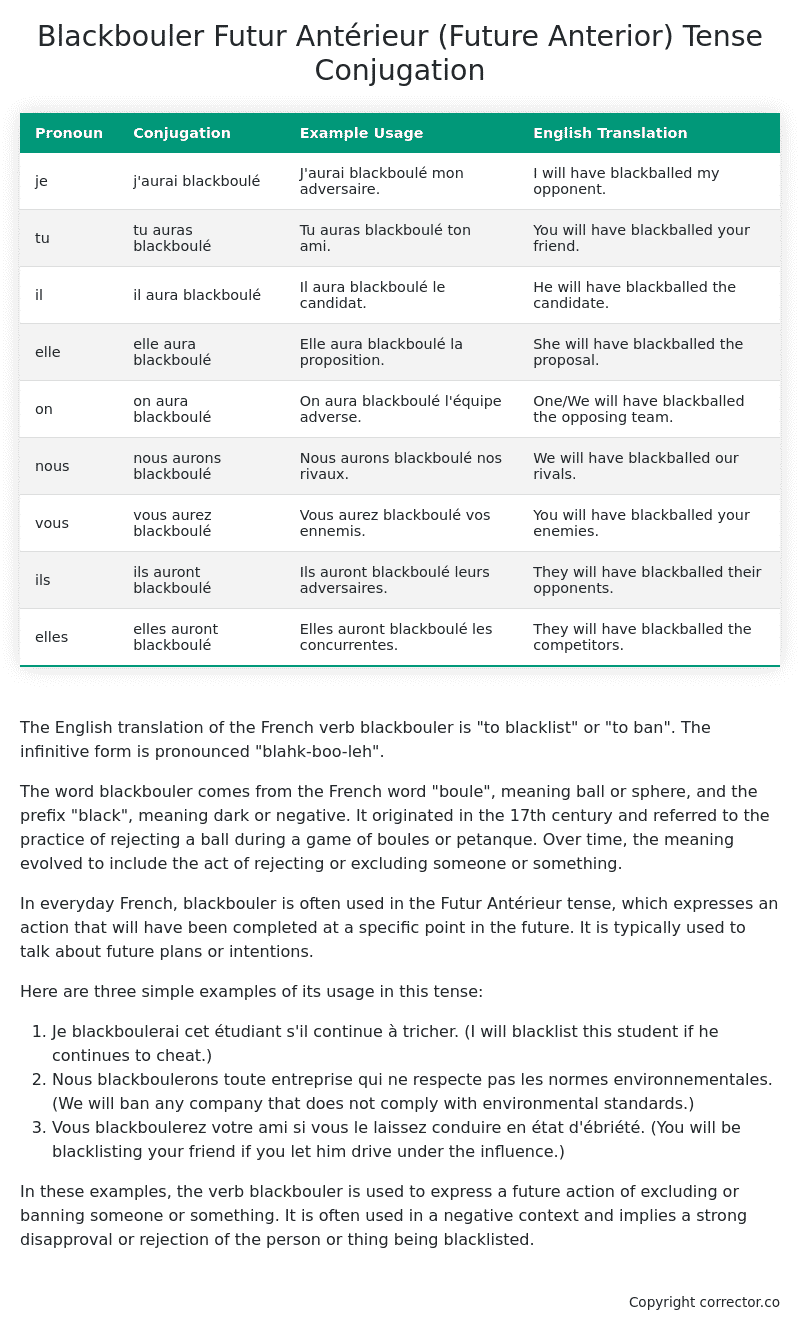Futur Antérieur (Future Anterior) Tense Conjugation of the French Verb blackbouler
Introduction to the verb blackbouler
The English translation of the French verb blackbouler is “to blacklist” or “to ban”. The infinitive form is pronounced “blahk-boo-leh”.
The word blackbouler comes from the French word “boule”, meaning ball or sphere, and the prefix “black”, meaning dark or negative. It originated in the 17th century and referred to the practice of rejecting a ball during a game of boules or petanque. Over time, the meaning evolved to include the act of rejecting or excluding someone or something.
In everyday French, blackbouler is often used in the Futur Antérieur tense, which expresses an action that will have been completed at a specific point in the future. It is typically used to talk about future plans or intentions.
Here are three simple examples of its usage in this tense:
- Je blackboulerai cet étudiant s’il continue à tricher. (I will blacklist this student if he continues to cheat.)
- Nous blackboulerons toute entreprise qui ne respecte pas les normes environnementales. (We will ban any company that does not comply with environmental standards.)
- Vous blackboulerez votre ami si vous le laissez conduire en état d’ébriété. (You will be blacklisting your friend if you let him drive under the influence.)
In these examples, the verb blackbouler is used to express a future action of excluding or banning someone or something. It is often used in a negative context and implies a strong disapproval or rejection of the person or thing being blacklisted.
Table of the Futur Antérieur (Future Anterior) Tense Conjugation of blackbouler
| Pronoun | Conjugation | Example Usage | English Translation |
|---|---|---|---|
| je | j’aurai blackboulé | J’aurai blackboulé mon adversaire. | I will have blackballed my opponent. |
| tu | tu auras blackboulé | Tu auras blackboulé ton ami. | You will have blackballed your friend. |
| il | il aura blackboulé | Il aura blackboulé le candidat. | He will have blackballed the candidate. |
| elle | elle aura blackboulé | Elle aura blackboulé la proposition. | She will have blackballed the proposal. |
| on | on aura blackboulé | On aura blackboulé l’équipe adverse. | One/We will have blackballed the opposing team. |
| nous | nous aurons blackboulé | Nous aurons blackboulé nos rivaux. | We will have blackballed our rivals. |
| vous | vous aurez blackboulé | Vous aurez blackboulé vos ennemis. | You will have blackballed your enemies. |
| ils | ils auront blackboulé | Ils auront blackboulé leurs adversaires. | They will have blackballed their opponents. |
| elles | elles auront blackboulé | Elles auront blackboulé les concurrentes. | They will have blackballed the competitors. |
Other Conjugations for Blackbouler.
Le Present (Present Tense) Conjugation of the French Verb blackbouler
Imparfait (Imperfect) Tense Conjugation of the French Verb blackbouler
Passé Simple (Simple Past) Tense Conjugation of the French Verb blackbouler
Passé Composé (Present Perfect) Tense Conjugation of the French Verb blackbouler
Futur Simple (Simple Future) Tense Conjugation of the French Verb blackbouler
Futur Proche (Near Future) Tense Conjugation of the French Verb blackbouler
Plus-que-parfait (Pluperfect) Tense Conjugation of the French Verb blackbouler
Passé Antérieur (Past Anterior) Tense Conjugation of the French Verb blackbouler
Futur Antérieur (Future Anterior) Tense Conjugation of the French Verb blackbouler (this article)
Subjonctif Présent (Subjunctive Present) Tense Conjugation of the French Verb blackbouler
Subjonctif Passé (Subjunctive Past) Tense Conjugation of the French Verb blackbouler
Subjonctif Imparfait (Subjunctive Imperfect) Tense Conjugation of the French Verb blackbouler
Conditionnel Présent (Conditional Present) Tense Conjugation of the French Verb blackbouler
Conditionnel Passé (Conditional Past) Tense Conjugation of the French Verb blackbouler
L’impératif Présent (Imperative Present) Tense Conjugation of the French Verb blackbouler
L’infinitif Présent (Infinitive Present) Tense Conjugation of the French Verb blackbouler
Struggling with French verbs or the language in general? Why not use our free French Grammar Checker – no registration required!
Get a FREE Download Study Sheet of this Conjugation 🔥
Simply right click the image below, click “save image” and get your free reference for the blackbouler Futur Antérieur tense conjugation!

Blackbouler – About the French Futur Antérieur (Future Anterior) Tense
Construction
Common Everyday Usage Patterns
Interactions with Other Tenses
For example
Summary
I hope you enjoyed this article on the verb blackbouler. Still in a learning mood? Check out another TOTALLY random French verb conjugation!


